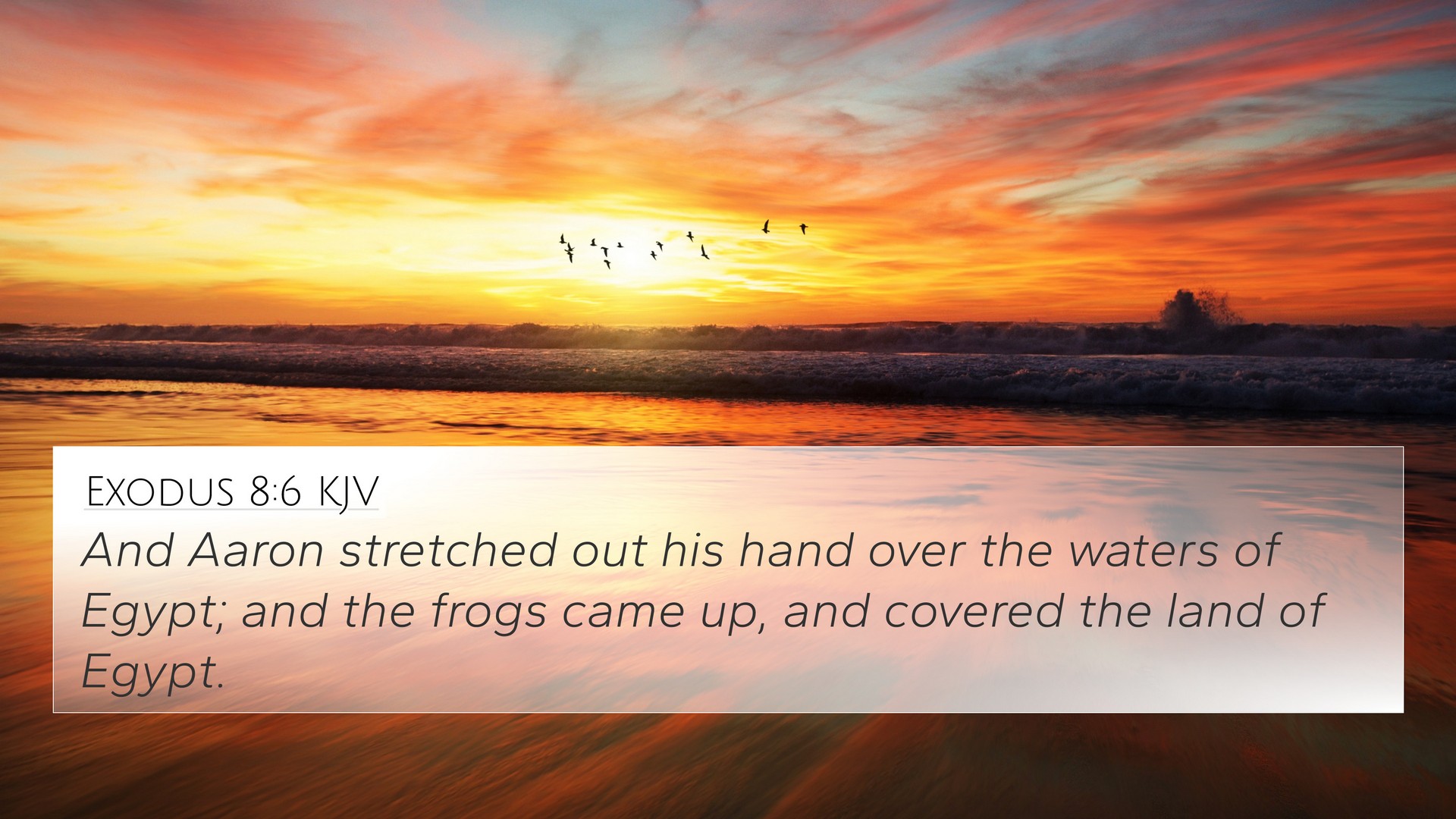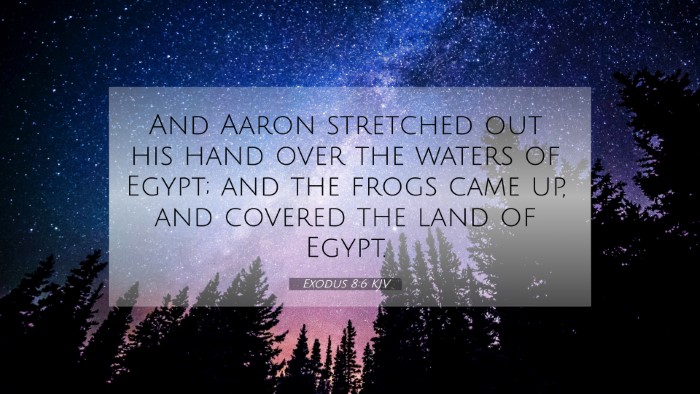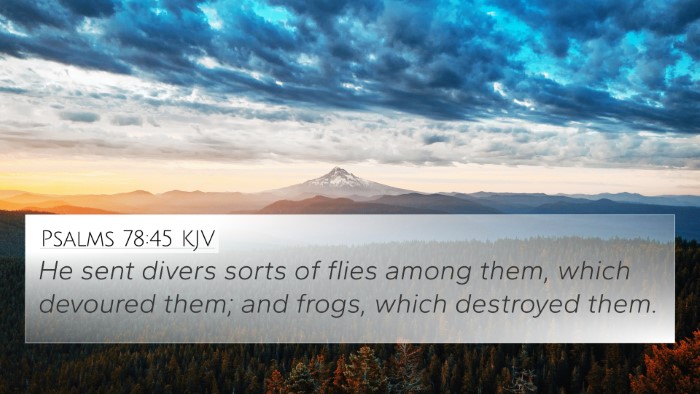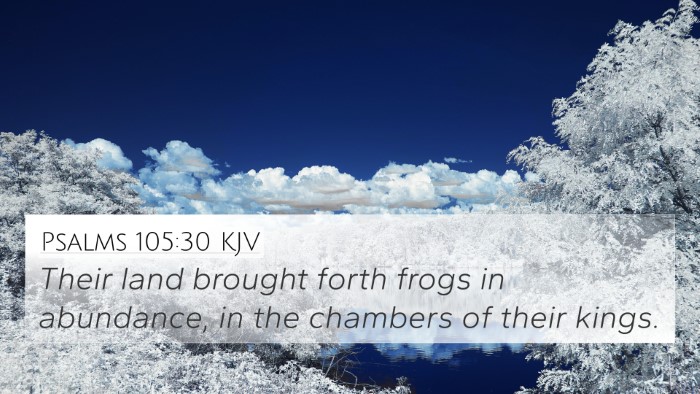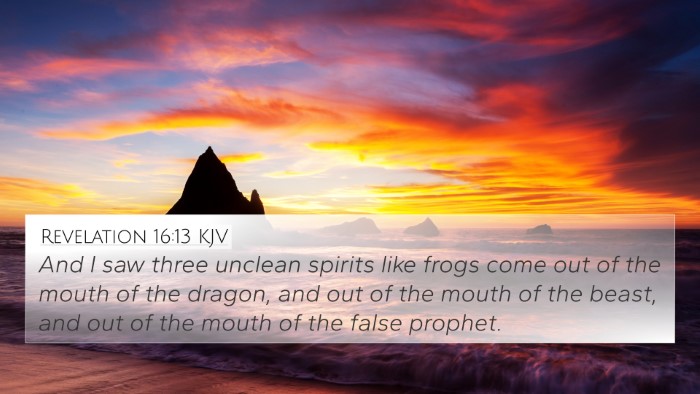Understanding Exodus 8:6
Verse: Exodus 8:6 - "And Aaron stretched out his hand over the waters of Egypt; and the frogs came up, and covered the land of Egypt."
Summary of Exodus 8:6
This verse narrates a significant act of divine intervention during the plague of frogs that God inflicted upon Egypt. Aaron, the spokesperson for Moses, obeys God's command by stretching out his hand over the waters, leading to a supernatural occurrence where frogs emerge in overwhelming numbers, covering the land.
Commentary Insights
-
Matthew Henry: Henry emphasizes the authority of God displayed through Moses and Aaron. He interprets the event as a demonstration of God's power over nature and false gods of Egypt. The frogs serve as a reminder of the consequences of Pharaoh's hardened heart and refusal to obey God's command.
-
Albert Barnes: Barnes points out that this plague, like others, was designed to show the impotence of the Egyptian deities, particularly Heket, who was depicted as a frog. He notes the extraordinariness of the plague and how it was an immediate response to Pharaoh's obstinacy.
-
Adam Clarke: Clarke remarks on the symbolic meaning of the frogs, interpreting them as a representation of excessive multiplication or blessings transformed into burdens. The frogs, while initially a sign of God's power, soon became a source of distress for the Egyptians, illustrating the duality of God's blessings and curses.
Bible Verse Cross-References
Exodus 8:6 can be linked with several other scriptures that enhance its understanding and provide thematic connections:
- Exodus 7:20-21: The beginning of the plagues where God demonstrated His power through the waters turning into blood.
- Exodus 8:1-2: The introduction to the plague of frogs guided by God's command.
- Psalm 105:30: A reflection on the plague of frogs, highlighting its significance in the historical context of Israel's deliverance from Egypt.
- Isaiah 19:8: A prophecy regarding the judgment on Egypt, reinforcing the theme of divine retribution against hardened hearts.
- Revelation 16:13-14: The imagery of frogs used to describe unclean spirits reflects the theme of divine judgment and consequences of rebellion against God.
- Romans 9:17: Reference to God raising Pharaoh to display His power, reinforcing the narrative of divine purpose behind seemingly harsh judgments.
- Matthew 12:39-40: The New Testament echoes the signs and wonders of the Israelites, drawing parallels between Jesus's ministry and the signs exhibited in Exodus.
- Luke 11:15: Jesus rebukes the Pharisees, paralleling the challenge faced by Moses and Aaron against Pharaoh, illustrating the ongoing resistance to God's message.
- Acts 7:36: Stephen recounts the story of Moses, connecting Old Testament events to the early church's understanding of God’s deliverance.
- John 5:46: Jesus points to Moses, extending the significance of Exodus as integral to understanding the coming of the Messiah.
Thematic Bible Verse Connections
The themes arising from Exodus 8:6 can be effectively explored through various lenses:
-
Divine Authority: Throughout Exodus, God's sovereign control over creation is emphasized, reminding believers of His ultimate power and purpose.
-
Consequences of Rebellion: Pharaoh's hard-heartedness leads to progressive plagues, symbolizing how persistent sin can lead to disastrous outcomes.
-
Judgment and Deliverance: The plagues are dual in nature; they serve as judgment against Egypt while paving the way for Israel's deliverance.
-
Signs and Wonders: The miracles performed through Moses and Aaron are foundational in affirming the credibility of God’s chosen messengers and His covenant with Israel.
-
Societal Impact of Divine Judgment: The frogs inundate Egypt, altering the landscape and its normalcy, illustrating how God's interventions can dramatically reshape societal realities.
Tools for Bible Cross-Referencing
For those seeking to delve deeper into the interconnectedness of Scriptures, utilizing a Bible Concordance is invaluable. Here are several tools that can aid in cross-referencing:
- Bible cross-reference guide
- Cross-reference Bible study materials
- Bible reference resources
- Bible chain references
- Comprehensive Bible cross-reference materials
Conclusion
Exodus 8:6 is rich with meaning and interconnected themes that challenge the reader to reflect on God's sovereignty, the nature of sin, and the redemptive history of Israel. Cross-referencing this verse leads to a broader understanding of biblical narratives, informing both personal faith and scholarly exploration.
Further Study Suggestions
To more fully grasp the meaning and implications of Exodus 8:6, we recommend studying the surrounding chapters in Exodus, as well as considering the Levitical laws that follow, which contrast the conditions in Egypt. Additionally, explore New Testament references that allude to the events of Exodus to see how they form a cohesive narrative leading to redemption through Christ.
